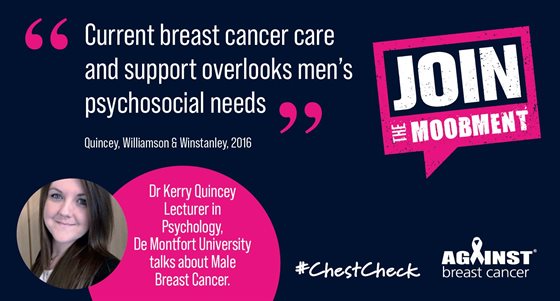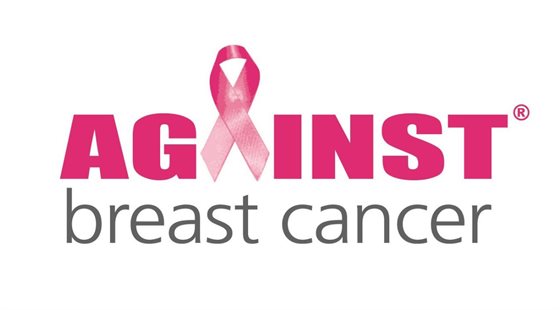De Montfort University Leicester (DMU) research exploring the emotional impact that breast cancer has on male patients will be used to inform new campaigns by a leading charity in the sector.
Against Breast Cancer (ABC), a national non-profit organisation that funds ground-breaking research into secondary spread breast cancer, focussing on prevention, detection and therapies. ABC has welcomed Psychology lecturer Dr Kerry Quincey on board to offer expert insights into the affects the disease has on men.

Dr Kerry Quincey
Dr Quincey, an active researcher from the Institute of Psychological Sciences at DMU, is the charity’s first collaborative psychologist. Her work looks at how the lived experience of male breast cancer not only affects the individual themselves in many ways, but reaches those close to them too.
“Against Breast Cancer has this year launched its first male-specific breast cancer awareness campaign called the Moobment,” explained Dr Quincey. “They are keen to know more about the psychological aspects of breast cancer and specifically the lived experiences of breast cancer in men, which is exactly what my work explores, so it’s a great fit.”

Dr Quincey’s latest research looks at how a breast cancer diagnosis affects men on a psycho-emotional, -social and -sexual level, and how they feel this affects their masculinity.
In the largest single qualitative study on this topic to date, she asked UK men, including patients who are currently undergoing treatment and survivors, to give their accounts and share self-authored photographs.
“I am very passionate about raising awareness of the disease in men and seeing this gain more coverage to improve men's lives and illness outcomes,” continued Dr Quincey.
RELATED NEWS
Male breast cancer patients do not receive the same support as female patients, says a new study
Be Inspired. Come to the DMU Digital Open Day
Find out more about studying a Master's in Health Psychology
In addition to the charity’s primary research objectives, Against Breast Cancer also provides talks, lab tours and support materials for patients to fulfil their education objective.
As part of the new partnership, Dr Quincey has been asked to help produce a male-specific patient information leaflet that will acknowledge the unique experiences of men diagnosed with breast cancer.
There are approximately 400 new cases in UK men presenting each year compared to around 55,000 women. “Consequently, breast cancer in men is often overlooked,” explained Dr Quincey.
“Breast cancer is responsible for proportionally more male deaths annually than some men’s cancers, including penile and testicular forms – 22% of men diagnosed with breast cancer die, compared to around 21% of those with penile and 2.5% of those with testicular. That is why campaigns like the Moobment are so important.
“Ultimately, I would like our staff and students, both male and female, to be more aware that men are also at risk of breast cancer. In the same way we encourage women to go for their smear test and to self-examine their breasts and motivate men to know the signs of testicular and prostate cancer, we should also be encouraging men to check their chests.”
Kelly Gibson, Head of Fundraising at Against Breast Cancer, said: “We wanted to create something stand-out that would mobilize people to spread the word and raise awareness of male breast cancer. We wanted men to feel part of a movement to do so. After some play on words to incorporate male breasts, ‘Moobment’ was born.”
Alongside raising awareness of male breast cancer and providing information on the disease, the Moobment campaign invites men to join a private Facebook community run by Against Breast Cancer, providing men with breast cancer a safe space to support each other through diagnosis, treatment and beyond.
“To think that this is just the beginning of what will hopefully be a long-standing, impactful relationship between DMU and Against Breast Cancer is really encouraging and exciting for me as a researcher in this field,” added Dr Quincey.
“Not only will the collaboration be extremely useful for future research, it will also inform my lectures on Health Psychology.”

‘We are delighted with the impact the Moobment has had,” said Bryony Jones, Communications Manager for ABC. “The reaction from supporters has been incredible and the campaign itself has generated some fantastic collaborative opportunities.
“We pride ourselves on our ability to connect with professionals and organisations to increase the value of what we can offer to people affected by breast cancer. The work we are planning with Dr Kerry Quincey is particularly exciting in enabling us to generate much needed resources for men with breast cancer.”
Founded in 1993, Against Breast Cancer’s ultimate goal is to stop secondary breast cancer from claiming lives, their unique approach is to do this by focusing their research on prevention, detection and therapies. For more information visit www.againstbreastcancer.org.uk
You can join the Moobment by going to www.moobment.co.uk
Posted on Friday 3 July 2020